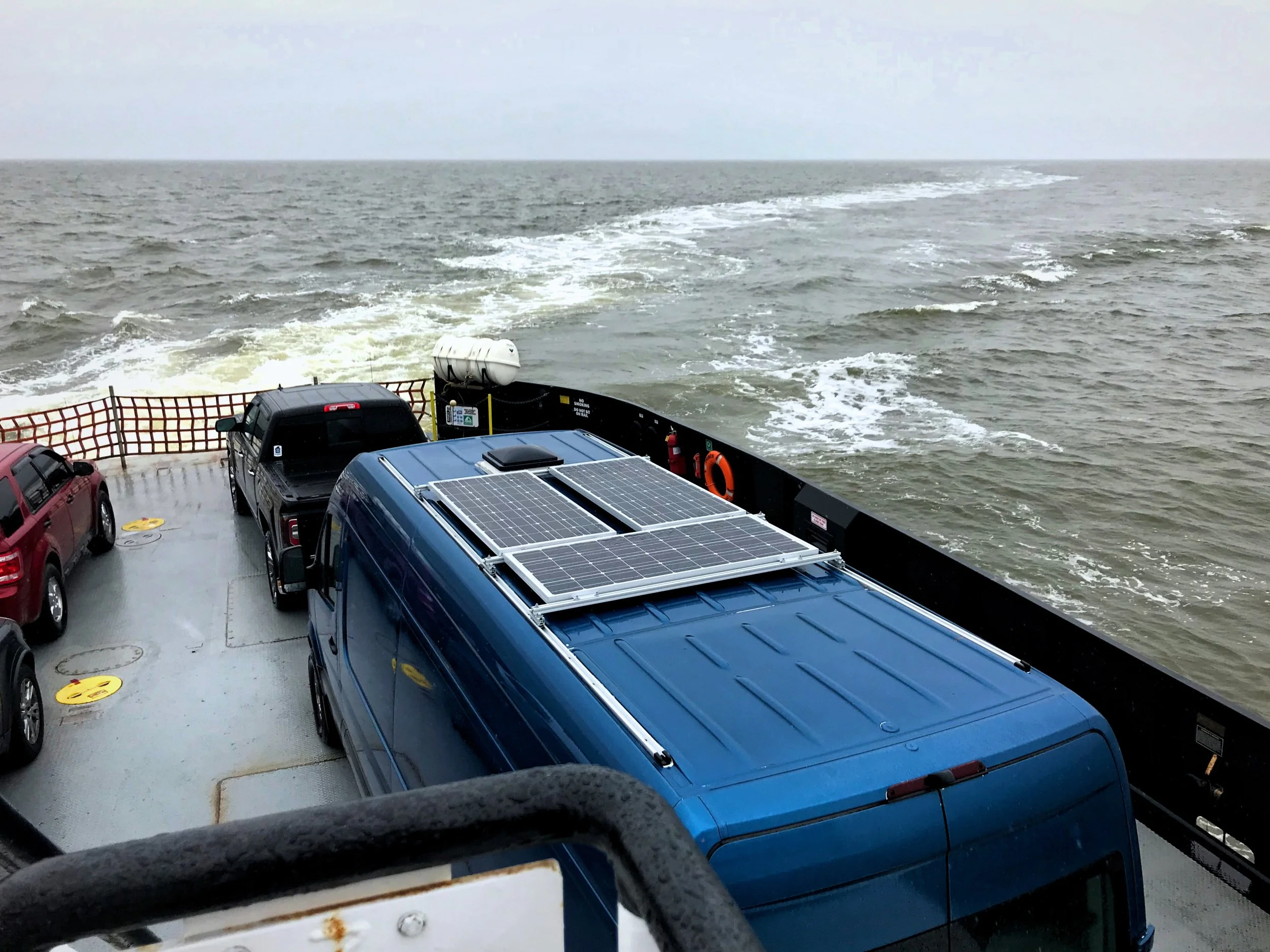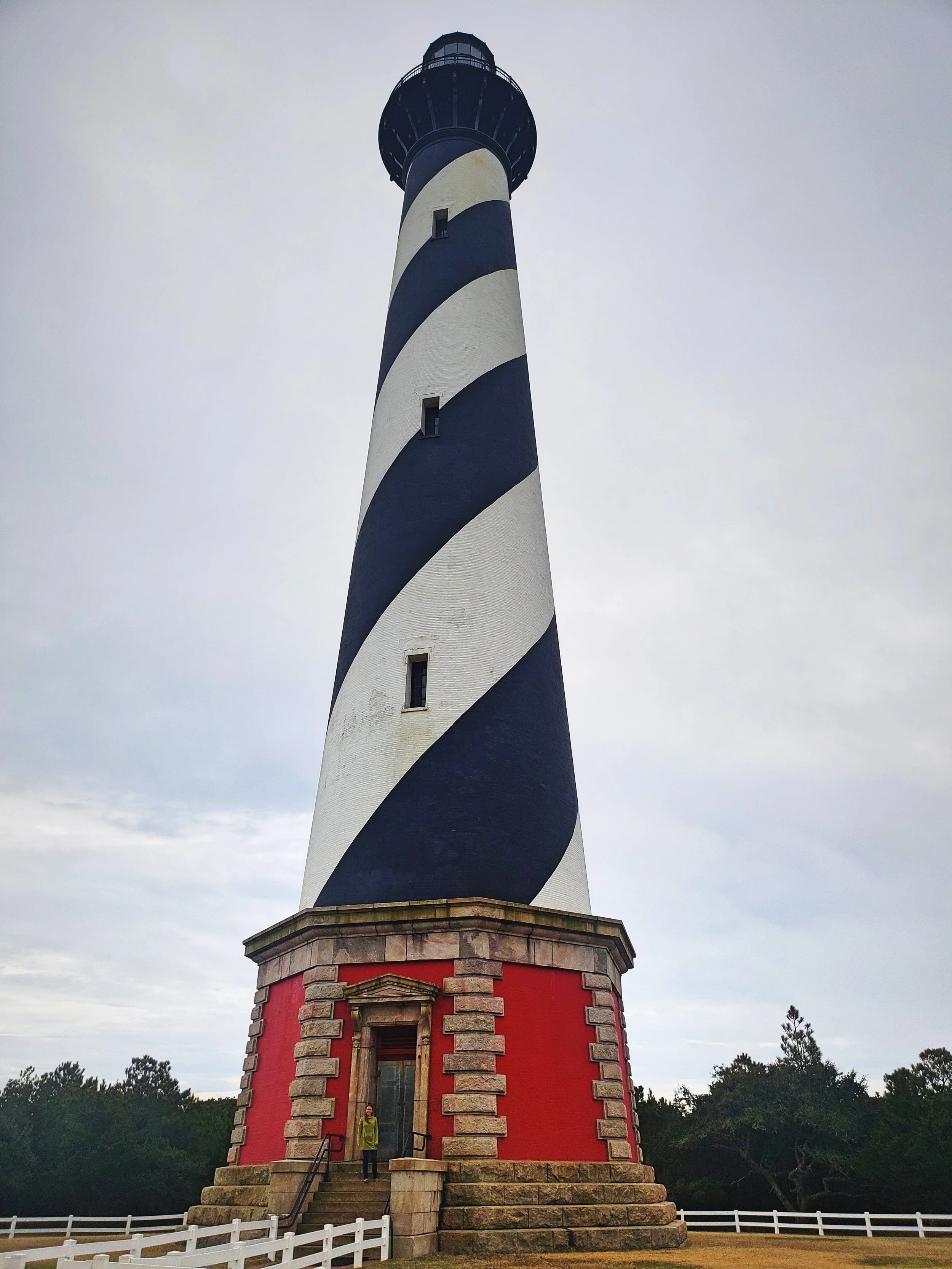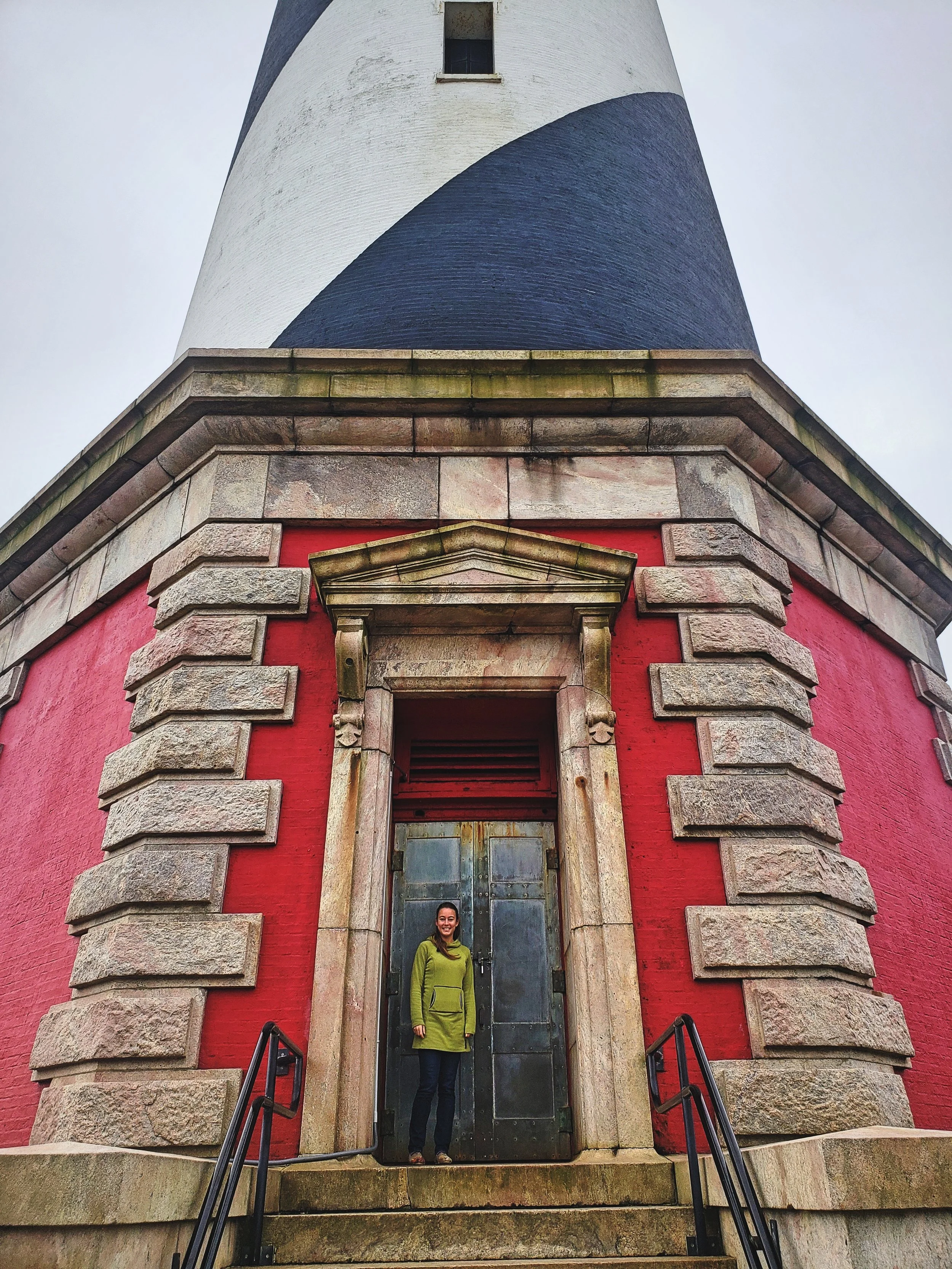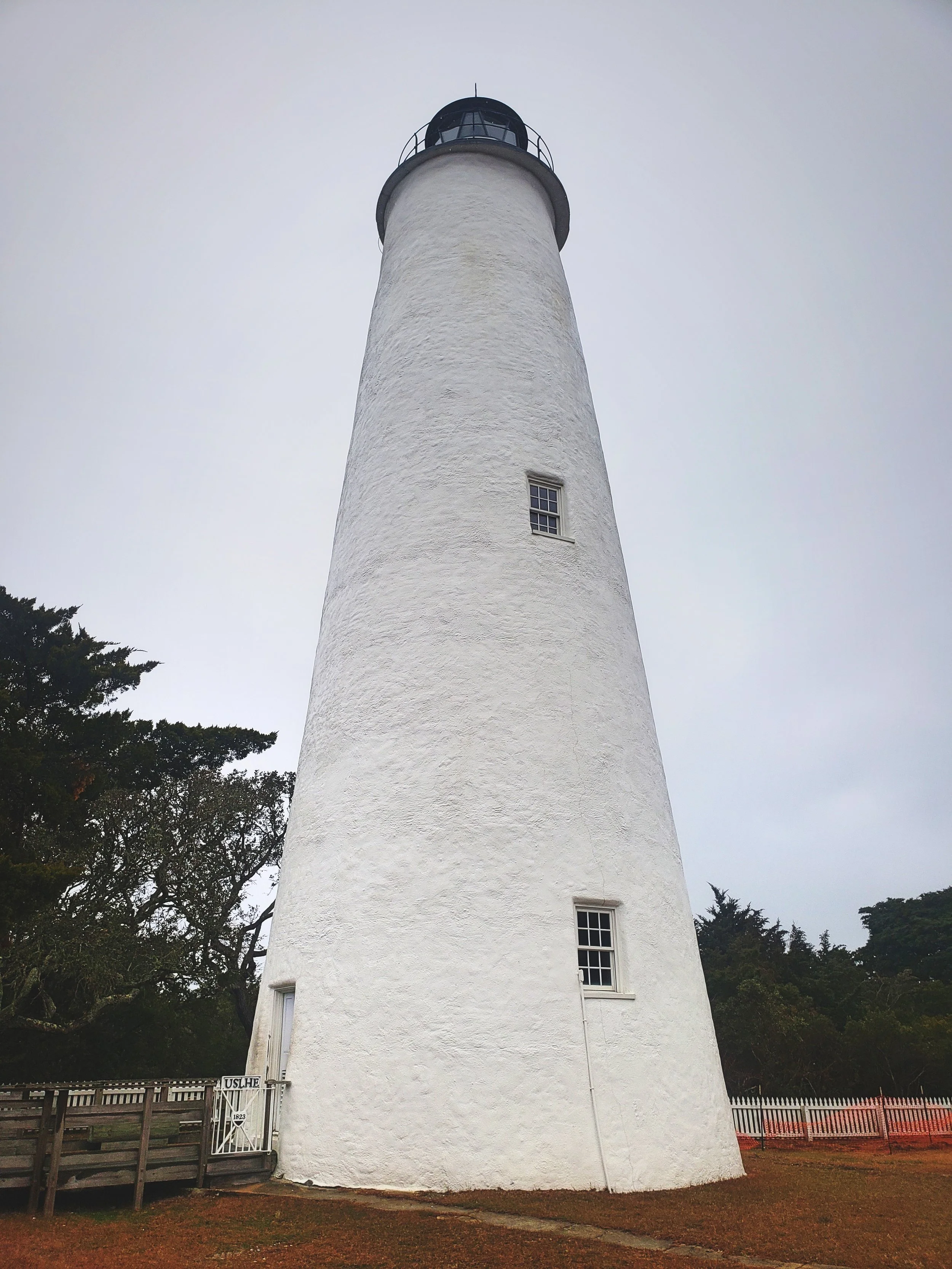The Outer Banks of North Carolina in a Camper Van in Winter: A Case of Bad Timing
The Outer Banks are one of the biggest travel destinations in North Carolina. The Outer Banks are a narrow barrier island with water on either side on the east coast of North Carolina. White sandy beaches stretch into the distance. Colorful houses stand on skinny legs ready for flooding. And blissful buttery seafood abounds.
That said, there are some places that are just not conducive to traveling in a camper van. The Outer Banks in winter just might be one of those places.
The drive along Highway 12 in the Outer Banks is amazing because you are often driving on such a narrow strip of land that there is water just outside both doors.
We endured some pretty cold, wet weather in the Outer Banks, but we still saw a lot.
Don’t get us wrong, the ocean is beautiful in winter—all the shades of gray and heavy clouds. But it’s hard to enjoy the white sandy beaches when it’s raining and cold. Plus we couldn’t find any free camping spots! We checked out some beach spots, but they were totally eroded by the sea. We ended up sleeping in the parking lot of a visitor center/rest area where it was very unclear if we were allowed. (Oh well, isn’t that what rest area means?)
The other thing about the Outer Banks in winter is that almost everything is closed for the season. Restaurants, stores, coffee shops, visitor centers, museums, and parks! You’ll find a few places open, enduring the chilly weather, but they are few and far between.
Riding the totally free Ocracoke Ferry is a fun activity for winter in the Outer Banks.
Pouring rain could never stop me from checking out a Little Free Library, especially if it’s this enormous!
The absolutely massive Cape Hatteras Lighthouse. To give you some sense of scale, I’m standing at its base!
Cape Hatteras Lighthouse
We visited the Cape Hatteras Lighthouse, part of the Cape Hatteras National Seashore while visiting the Outer Banks in February. In summer you can climb the tower, but in winter it’s closed. The museum was still open though so we did learn some interesting maritime history. The Cape Hatteras lighthouse is a beautiful black and white striped, barber-pole painted tower with a red base—very nautical. The Cape Hatteras Light is 210 feet tall. It’s the tallest brick lighthouse in the US and the second tallest in the world.
The Cape Hatteras Lighthouse is an exceptionally nautical looking lighthouse.
In summer you can climb the Cape Hatteras Lighthouse tower, but in winter it’s closed.
We were especially captivated by these weathered old doors on the Cape Hatteras Lighthouse.
To think that this elegant tower was constructed in 1868, before modern machinery is incredible. What is even more mind blowing is that the light house was relocated 2900 feet from it’s original position. Because of serious shoreline erosion, the lighthouse risked falling into the sea. The National Park Service moved the lighthouse and the accompanying lighthouse keepers’ residences on rollers back from the encroaching waves.
This is the home where the lighthouse keepers would live.
The Cape Hatteras Lighthouse and all its outbuildings have been moved back from the sea.
Ocracoke Ferry
One unique thing that we’ve only ever done in the Outer Banks is take our van on a ferry. We’ve considered taking ferries in places like Alaska or Washington State, but we’ve faced exorbitant oversized vehicle fees for our 24-foot long vehicle. Unlike these, the Ocracoke Island Ferry is free for every size vehicle! You can take a semi-truck on it if you want!
It takes about 45 minutes to ride from Hatteras to Ocracoke on the ferry.
Ian sitting in the passenger lounge of the Ocracoke Ferry.
The ferry, which runs every 30 minutes to an hour in winter take you from Hatteras to Ocracoke Island in 45 minutes. (Find the ferry schedule here.) For us it was fun to be moving in the van, but not to be driving. We sat on the bed (something we never do while driving), did the dishes, and I even tried to do yoga on the rocking boat. We also made a trip to the passenger lounge—which was a super exciting room with benches.
Ocracoke Island
Once you arrive at Ocracoke Island, it’s a 13 mile drive to the village of Ocracoke. In winter it’s dead here. I think we may have been the only tourists on the ferry, and much of the town was shut down for the winter season. Since it was raining and it was only in the 30s, hiking or visiting the beach wasn’t a very appealing option. We did warm up with some coffee from Magic Bean Coffee, a quirky tiny place with a large porch.
The trees on Ocracoke Island are incredible, because they are beautifully gnarled by the ocean.
Ian stands on the steps of the closed Ocracoke Island Visitor Center.
Ocracoke Lighthouse
While on the island we paid a visit to the Ocracoke Lighthouse. It’s a fairly squatty white lighthouse you can ‘t climb in either summer or winter. At least we didn’t feel like we were missing out on anything! Our favorite part of visiting the Ocracoke Lighthouse was checking out the low, moss-covered oak trees nearby the lighthouse.
The Ocracoke Lighthouse is much more quaint that the Cape Hatteras Lighthouse.
The Ocracoke Light is one of the oldest operational lights in North Carolina.
We actually thought the trees around the lighthouse were way more interesting than the tower itself.
Outer Banks Brewing Station, Kill Devil Hills
Ian and I celebrated Valentine’s Day a bit early on our way out of the Outer Banks. We had a romantic dinner at Outer Banks Brewing Station in Kill Devil Hills, which is probably a bit pricier than the typical restaurant we would visit. We enjoyed their bourbon barrel stout—the perfect beer for a cold winter day! Since we were in the Outer Banks, we ate a totally seafood meal—all of which was scrumptious. We started with seared tuna with wasabi sauce. I had scallops as my entrée and Ian had flounder fish and chips. If we had to recommend one place to go in the Outer Banks during winter, Outer Banks Brewing Station would be it!
We couldn’t leave the Outer Banks without getting some seafood and a cold one.
Posts Also Tagged:
Beaches, Beer, Books, Cape Hatteras LighthouSe, Cape Hatteras national Seashore, CITIES, Ferries, FOOD, FREE CAMPING, FRUGAL TRAVEL, HISTORY, Islands, Lighthouses, MUSEUMS, NORTH CAROLINA, Ocean, Ocracoke Ferry, OcRacoke Island, Ocracoke Lighthouse, Outer Banks, ROAD TRIP, Shipwrecks, TRAVEL, TREES, VANLIFE, Winter Travel
Have you found free camping spots in the Outer Banks or visited in van? Tell us about it in the comments below!



















